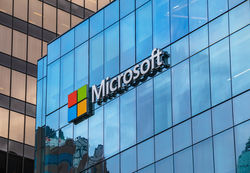
Tech giant Microsoft Corporation (MSFT) closed its last trading session at $241.68, well above its 52-week low of $213.43. Moreover, the company is trading at a premium valuation compared to its peers.
In terms of forward P/E, MSFT is trading at 25.31x, 7.6% higher than the industry average of 23.53x. Its forward non-GAAP PEG multiple of 1.96 is 27.9% higher than the industry average of 1.53.
Last month, the company laid off under 1,000 employees across several divisions, joining other big tech companies that are cutting jobs in anticipation of an economic downturn. However, MSFT’s layoffs affected less than 1% of its total workforce of around 221,000 as of June 30.
Moreover, this tech giant continues to invest in strategic growth initiatives. Recently, a collaboration with chip juggernaut NVIDIA Corporation (NVDA) was announced, aimed at developing a ‘massive’ computer that can handle artificial intelligence computing work in the cloud.
An expansion of MSFT’s strategic partnership with aerospace company Lockheed Martin Corporation (LMT) was recently announced. This strategic relationship should help power the next generation of technology based on classified cloud advancements for the Department of Defense (DOD).
The company surpassed consensus EPS and revenue estimates in three out of the trailing four quarters. Moreover, analysts expect MSFT’s EPS to grow 13% per annum over the next five years.
Although the stock is down 28.1% year-to-date and 9.4% over the past six months, it has gained 1.7% over the past month. It is trading higher than its 50-day moving average of $238.31.
Here are the factors that could influence MSFT’s performance in the near term:
Solid Financials
For the fiscal first quarter that ended September 30, MSFT’s total revenue increased 10.6% year-over-year to $50.12 billion. Gross margin rose 9.5% from the prior-year quarter to $34.67 billion. Operating income improved 6.3% year-over-year to $21.52 billion. Net income and EPS came in at $17.56 billion and $2.35, respectively.
Robust Profitability
MSFT’s trailing-12-month EBIT margin and net income margin of 41.69% and 34.37% are 543.5% and 886.8% higher than the industry averages of 6.48% and 3.48%, respectively.
The stock’s trailing-12-month ROCE, ROTC, and ROTA of 42.88%, 21.97%, and 19.40% are 646.2%, 557.4%, and 975.7% higher than their respective industry averages of 5.75%, 3.34%, and 1.80%.
Strong Past Growth Story
MSFT’s revenue grew at a 16.1% CAGR over the past three years and a 15.4% CAGR over the past five years. Its EBIT and net income grew at 22.8% and 19.3% CAGRs over the past three years. Its EPS increased at a 20.6% CAGR over the same period.
Solid Dividend
In September, MSFT announced a six-cent or a 10% sequential increase in its quarterly dividend to $0.68 per share. The increased dividend is payable to shareholders on December 8, 2022.
Its annual dividend of $2.72 yields 1.13% at the current price level. The company’s dividend payouts have increased at a 10.4% CAGR over the past three years and a 9.8% CAGR over the past five years. MSFT has a record of 18 years of consecutive dividend growth.
Favorable Wall Street Sentiment
In the last three months, 28 Wall Street analysts have rated MSFT. Of them, 25 rated the stock a Buy, while three gave it a Hold rating. The 12-month median price target of $292.58 indicates a 21.1% potential upside. The price targets range from a low of $234 to a high of $411.
POWR Ratings Reflect Promising Prospects
MSFT’s strong fundamentals are reflected in its POWR Ratings. The stock has an overall rating of B, which equates to Buy in our proprietary rating system. The POWR Ratings are calculated by considering 118 different factors, with each factor weighted to an optimal degree.
Our proprietary rating system also evaluates each stock based on eight distinct categories. MSFT has a B grade for Quality, consistent with its impressive profitability. It has a Stability grade of B, in sync with its five-year beta of 0.92.
In the 53-stock Software – Business industry, it is ranked #9.
Click here to see the additional POWR Ratings for MSFT (Growth, Value, Momentum, and Sentiment).
View all the top stocks in the Software – Business industry here.
Bottom Line
MSFT has been investors’ darling for a long time, and the company is taking up strategic growth initiatives to boost its varied business. Also, MSFT’s steady dividend growth record is rewarding for investors. Analysts still expect a more than 20% upside in its stock. Hence, MSFT might be a solid buy at the current price level despite its premium valuation.
How Does Microsoft Corporation (MSFT) Stack up Against Its Peers?
While MSFT has an overall POWR Rating of B, one might consider looking at its industry peer, VMware, Inc. (VMW), which has an overall A (Strong Buy) rating.
MSFT shares were trading at $240.87 per share on Friday morning, down $0.81 (-0.34%). Year-to-date, MSFT has declined -27.71%, versus a -15.62% rise in the benchmark S&P 500 index during the same period.
About the Author: Anushka Dutta

Anushka is an analyst whose interest in understanding the impact of broader economic changes on financial markets motivated her to pursue a career in investment research.
Is Microsoft Stock Worth the Price? StockNews.com






